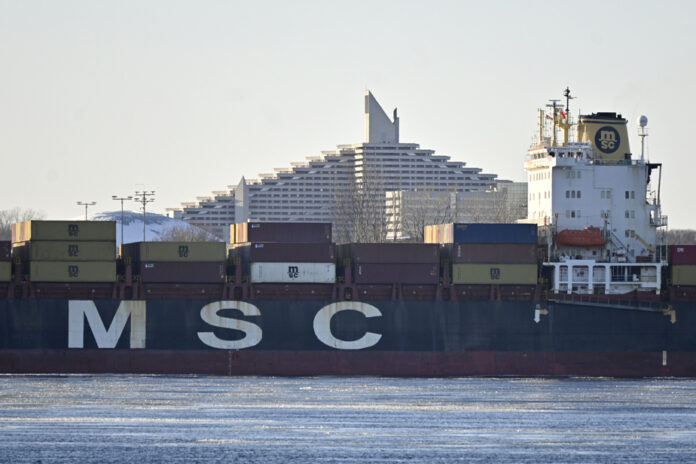(Dubai) Five of the world’s largest maritime carriers along with France, South Korea and Denmark adopted a joint declaration on Friday at COP28 in Dubai to promote the adoption of “a robust regulatory framework” for by 2027 promoting the ecological transition of the sector.
The signatories promise to work to establish “an international standard” to precisely measure the sector’s emissions, it is written in the declaration.
They also commit to promoting “an international greenhouse gas pricing mechanism”, the equivalent of a carbon tax, “to incentivize energy efficiency and reduce the price gap between fossil fuels and sustainable maritime fuels”.
The signatory carriers – Italian-Swiss MSC, Danish Maersk, French CMA CGM, German Hapag-Lloyd and Korean HMM – have also committed to reducing their emissions beyond the targets set by the Maritime Organization international (IMO) at the beginning of July.
Such a coalition, bringing together all of the world’s largest carriers, with the exception of the Chinese Cosco, is unprecedented.
They promise to “reduce total emissions [from their fleet] by 30% by 2030 compared to 2008” compared to 20% requested by the IMO. By 2040, the objective is increased to -80% of emissions compared to -70% according to IMO standards. A reduction in net emissions to zero must be achieved “by 2050 at the latest”.
The coalition also advocates the implementation of “construction standards for new ships”. Carriers are considering agreeing on a date beyond which it would be mandatory for all new ships to be powered by zero or near-zero emissions fuel. Currently, almost 99% of the world’s fleet is powered by heavy fuel oil.
“We want to put an end to the delivery of ships running solely on fossil fuels,” insisted Soren Toft, boss of the world’s largest carrier, MSC.
The signatory States undertake, in addition to establishing “a level playing field” internationally, to “accelerate the production and supply of sustainable maritime fuels in sufficient quantities”.
Shipping accounts for 3% of global greenhouse gas emissions and transports more than 80% of goods traded globally. According to the UN, the transition of the sector, whose emissions have jumped 20% in a decade, could cost around US$100 billion per year.

